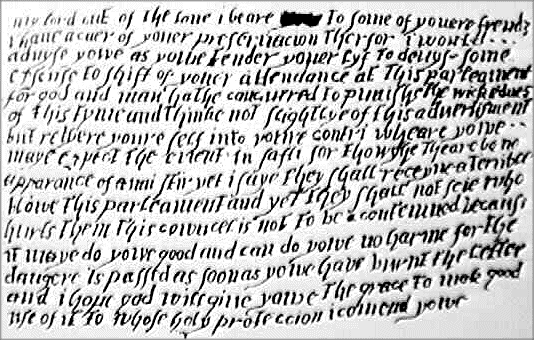
Mounteagle's Letter
My lord out of the love i beare (Editor's Note: the word yowe is inked out) to some of youere frends i have a care of youer preservacion hterefor i would advyse yowe as yowe tender youer lyf to devys some exscuse to shift of youer attendance at this parleament for god and man hath concurred to punishe the wickednes of this tyme and thinke not slightlye of this advertisement but retyere youre self into youre contri wheare yowe maye expect the event in safti for thowght theare be no apparance of anni stir yet i saye they shall receyve a terrible blowe this parleament and yet they shall not sei who hurts them this councel is not to be contemned because it maye do youwe good and can do yowe no harme for the dangere is passed as soon as yowe hve burnt the letter and i hope god will give yowe the grace to mak good use of it to whose holy proteccion i commend yowe.Following the plot, in the spirit of the age, rich and beautifully worded poetry and patriotic tracts were composed for popular consumption. These were provided as much as entertaining art as they were for the purposes of nationalistic propaganda.
One of the most famous long poems composed about the plot was Mischeefes Mysterie written about 10 years later by Francis Herring. It is fitting that I let Herring tell you in the language and the print of the time of the receipt of the letter described above. It is a good example of the language of the period and conveys the drama and mystery of the event itself as told in the language of the conspirators.
Thefe ftrange conteuts his thoughts much discontent,
A thoufand congitatiions hence arife:
What fact? what friend? what this Enigma ment?
What myficke danger thefe words might difguife?
Or whether t' were fome addleidle braine,
That this had writ,to caufe him thence refraine.
If it fhould prooue a fond fantafticke toy,
To fhirre therein would turne to his disgrace:
But if it fhould include fome direannoy
Vnto his person, or that facred place
Of Parliament, he then might proouedifloyall,
Hee's loth, and yet defires to make a triall,
Wherefore, at laft, as is fore-fpecified,
Gods facred Angell Meffenger of grace,
To his perplexed thoughts this cure applied,
And will'd him this occafion to embrace,
And in his heart kindled a zealous flame,
Not to conceale, but to reueale the fame.
Thricenoble Morley (quoth this Angell bright)
Whom Heau'n hath vouched worthy this great honor,
That thou fhouldft be the man shall bring to light,
Thy King and Countreyes threatned woe and horror;
By that vfurping whorish Beaft of Rome,
Who Albions lfland hopes now to confume.
O ftand not doubting, pondering in thy minde,
Whether this be a toy or true report,
A truth, a happy truth, thou heere fhalt finde
Of woe and wracke, to Countrey and to Court.
If thou it hide, a word of woes enfue,
If thou reueale it, honour be thy due.
And though this Letter feemeth moft obfcure,
Like great Apollow's Delphean Myfterie,
Yet I a Jofeph,Daniel will procure,
T'vntwine the twift of its obfcurity;
Since in thy hands then lies both weale and woe,
Hafte, hafte with fpeede, in Court this Letter fhow,
This happy motion driues out former doubt,
In this right noble Lord Monteagles hart:
Who now refolues t'examine and finde out
The truth heereof,and foorthwith to depart:
And though it were both dirty, darke and late,
Yet he the time will not procraffinate.
But like a noble Eagle hauing carcht
A rich, a princely prey, aloft he fores,
Hee's not at quiet till hee haue difpatcht
This great affaires: He Heau'ns great aydle implores
To aufpicate and grant a blitefullend,
To this moft anxious act he did intend
And thus with loyallheart away he goes,
Thereto refolu'd what euer fhould beride:
To th'Court he went this matter to difclofe,
To th'Earle of Salisbryes chamber foone hehide,
Whither heauens finger dooubtleff him direfed,
As the bell meanes to haue this fact detected.
Number 317, The English Experience, Francis Herring, Mischeefes Mysterie-Treasons, Master-Peece, The Powder Plot, London, 1617, Da Capo Press, Theatrvm Orbis Terrarvm Ltd., Amsterdam, New York, 1971, pp.35-36.
Would you like a little practice with your 17th century English? You will find below on this page several links to the language of the time. Give it a try! Perhaps you could even prepare a writing or recitation for your Guy Fawkes celebration.I have always wondered- would our politically correct and standardized spelling and grammar and printing look as dull to the folks of the 17th century as their language strikes us as dramatic, colorful, evocative, floral and theatrical, learned and spectacular?
I must and can say one thing: That's my kind of spelling! ( Just ask my editor! )
Due to this fellow Shakespeare living most of his life during the reign of Elizabeth I and due to the pre-occupation of the scholarlly world with his work, most links are related to the Elizabethan period. While we are aware of the changes which took place following the death of Elizabeth, (and we would like to be more aware of them. Please write!) we provide here links to Elizabethan resources as the best we can. Enjoy them!
Can you speak the language of Fawkes? Let us know!
 The Language Of The Plot
The Language Of The Plot